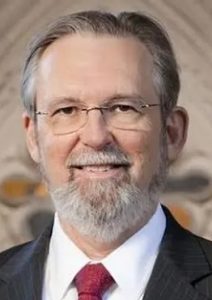In 1996, New Testament scholar Richard Hays wrote his most influential book, The Moral Vision of the New Testament. Christianity Today placed The Moral Vision on its list of the 100 most important books of the 20th century.
American evangelicals celebrated the fact that a highly regarded biblical scholar had confirmed their negative assessment of same-sex relationships. In a chapter on sexual morality, Hays noted the handful of relevant biblical texts all condemned same-sex intimacy. As a consequence, LGBTQ Christians should be welcomed into church membership with open arms — so long as they embraced lifelong celibacy, he said.
For decades, evangelical scholars could hardly discuss same-sex relationships without referencing Hays’ conclusions.
This fall, Hays released The Widening of God’s Mercy: Sexuality Within the Biblical Story, a book written with his son, Christopher Hays, an Old Testament scholar who teaches at Fuller Theological Seminary. The God of the Bible, the authors remind us, frequently changes his mind, even repents. From the beginning, God’s character is defined by mercy. The creation of the world was an act of mercy and, as the biblical drama unfolds, the circle of God’s mercy keeps expanding until the entire cosmos is encircled by the everlasting arms.
While the authors are fully aware God isn’t male, they note the careful avoidance of gendered language can sound stilted, even pretentious, to the uninitiated readers the authors for whom the book is written. Inclusive language has an impersonal ring, the authors contend; and that’s a problem when the character of God is at issue.
God’s mercy in the Old Testament
In the early chapters, Christopher Hays emphasizes that God changes his mind in order to expand the outer boundaries of the family of faith. While the people of Israel are the primary locus of divine love and mercy, God is always casting his eyes further afield. Abraham fathers a nation that will bless the entire world. The xenophobic prophet Jonah is angry with God: “I knew you are a gracious God and merciful, slow to anger, and abounding in steadfast love, and one who changes his mind about punishment.”
Prophets like Isaiah frequently expand the merciful intentions of God in ways so radical their contemporaries were scandalized. Although barred from the assembly of the faithful by Levitical law, eunuchs are welcomed into the family in Isaiah 56. Non-Jews receive the same merciful invitation: “Foreigners who join themselves to the LORD … I will bring to my holy mountain, and make them joyful in my house of prayer … for my house shall be called a house of prayer for all people,” says Isaiah 56:6-7.
God’s mercy in the New Testament
The elder Hays argues this inclusive vision of ever-expanding mercy animated the ministry of Jesus. In Luke 4, Jesus pleases the people by quoting Isaiah 61, a passage traditionally associated with the liberation of Israel from foreign domination. But he alienates his audience by shifting his attention to God’s merciful care for foreigners like the widow of Zarephath, and Naaman the Syrian. Jesus “understood Isaiah’s message to signify … not only the restoration of Israel, but also an expansion of the grace of Israel’s God to encompass foreign nations and to embrace outcasts.”
This explains why Jesus’ habit of healing on the Sabbath created such a stir. The scribes and Pharisees “should be understood as earnestly devout people,” Hays says, but they were unable to respond to obvious human need “because of their strong beliefs and their determination to uphold the authority of Scripture.”
Initially, apostles like Peter and Paul also were hobbled by a narrow legalism. God had to blind Saul of Tarsus and knock him off his horse to bring him around. Only after interacting with Gentile converts could Peter understand his kill-and-eat vision. If God was doing a new thing by including non-Jews in the family of faith, Peter concluded, “who was I to block him?”
A personal confession
Richard Hays didn’t change his mind about same-sex relationships because he altered his exegesis of relevant biblical texts. He still thinks Paul meant what he said in Romans and First Corinthians. But he no longer believes we can settle the issue of LGBTQ inclusion by applying the same weary arguments to a handful of texts. Instead, we need to reckon with the character of God.
“We advocate full inclusion of believers with differing sexual orientations,” the authors conclude, “not because we reject the authority of the Bible” but “because we affirm the force and authority of the bible’s ongoing story of God’s mercy.”
Richard Hays’ moral evolution began when Christians in committed same-sex relationships started appearing in his seminary classes and the pews of his church. These people had dedicated their lives to following Jesus. They were preparing for Christian ministry. They loved Jesus and knew Jesus loved them.
If the mercy of God was widening once again, Hays didn’t want to keep blocking him. Like the scribes and Pharisees who objected to Jesus, Hays was “uncomfortably aware of aching human need but constrained by my interpretation of Scripture from responding with grace or generosity.”
“I was more concerned about my own intellectual project than about the pain of gay and lesbian people.”
The mea culpas keep coming. Back in 1996, he confesses, “I was more concerned about my own intellectual project than about the pain of gay and lesbian people inside and outside the church, including those driven out of the church by unloving condemnation.”
In 2015, the elder Hays was diagnosed with pancreatic cancer. Along with shock and grief came the realization that a single chapter written 20 years earlier might stand as his legacy. The Widening of God’s Mercy sets the record straight.
Some helpful clarification
In a revealing New York Times interview with Peter Wehner, Richard Hays observes the behavior of conservative Christians also impacted his thinking. “In the conservative evangelical churches, there was a kind of smug hostility toward gay and lesbian people, and the attitudes that I was encountering there didn’t seem to me consonant with the New Testament’s portrayal of what people seeking to follow Jesus should be like.”
Hays’ conversation with Wehner clears up some of the issues The Widening of God’s Mercy doesn’t address in detail. Yes, he is saying Paul was wrong about same-sex relationships (and slavery and the role of women in the church as well).
He is also uncomfortable with the idea that our understanding of God evolves over time or the alternative notion that God is outgrowing old bigotries. But the biblical record makes clear “that over time, God reaches out to embrace more and more folks in the scope of the people that he regards as his own people.”
A cold reception in the evangelical world
In progressive Christian circles, The Widening of God’s Mercy has been welcomed as a somewhat belated confirmation of the liberal position. But the lion’s share of reviews were written before the book was available for purchase. The brief accompanying the press release gave the game away.
Opinion leaders in the conservative evangelical world responded with a mix of shock and grief. This comes as no surprise. When Hays admits the views he expressed in Moral Vision have damaged innocent people, he is indicting the entire evangelical community.
“Hays’ evolution on the issue of gay inclusion follows a familiar (and possibly inevitable) pattern.”
For many, accepting the book’s central thesis would risk excommunication from the evangelical tribe. Richard Hays’ change of heart is therefore attributed to social pressure exerted within a highly secularized academy.
How change happens
Hays’ evolution on the issue of gay inclusion follows a familiar (and possibly inevitable) pattern. The process began with a cultural revolution symbolized by the Supreme Court’s Obergefell decision in 2015. It was only when men and women in committed same-sex relationships started showing up in his church and seminary classes that the Methodist professor’s mind began to change. He is very clear about this pattern.
Cultural convulsions like the civil rights earthquake of the 1950s and ’60s, the feminist revolution or, more recently, the movement for gay rights, inevitably impact relationships. We find allies in strange places. We begin to distance ourselves from old friends. Families can be rent asunder. Social compacts break and new ones evolve.
For people of faith, changes in human relationships have inevitable theological implications. Does God pick favorites, preferring, say, male leaders to female leaders, Black people to white people, or straight folk to LGBTQ folk? The God who picks favorites is very different from the God who extends love and mercy to all in equal measure.
Change, then, begins with culture, overflows to relationships and can have profound theological implications. How we interpret the Bible (what scholars call our “biblical hermeneutic”) doesn’t change until our conception of God changes.
If I have made this evolution from culture, to relationship, to theology, to text sound simple, I apologize. It isn’t simple. It is agonizing. That’s why genuine change is rare, and the older we get, the more difficult it becomes. Difficult, but always possible. Richard Hays points the way. Thanks be to God.
Alan Bean serves as executive director of Friends of Justice. He is a member of Broadway Baptist Church in Fort Worth, Texas.
Related articles:
‘When you’re wrong, confess and seek forgiveness,’ Richard Hays says
Analysis: What to expect from The Widening of God’s Mercy | Analysis by Karen Keen
The healing ‘heresy’ of Richard Hays | Opinion by Brandan Robertson
An oft-quoted biblical scholar changes his mind on LGBTQ inclusion in the church
A new book on the Bible and LGBTQ folks by a straight, white man is not what we need | Opinion by Susan Shaw




